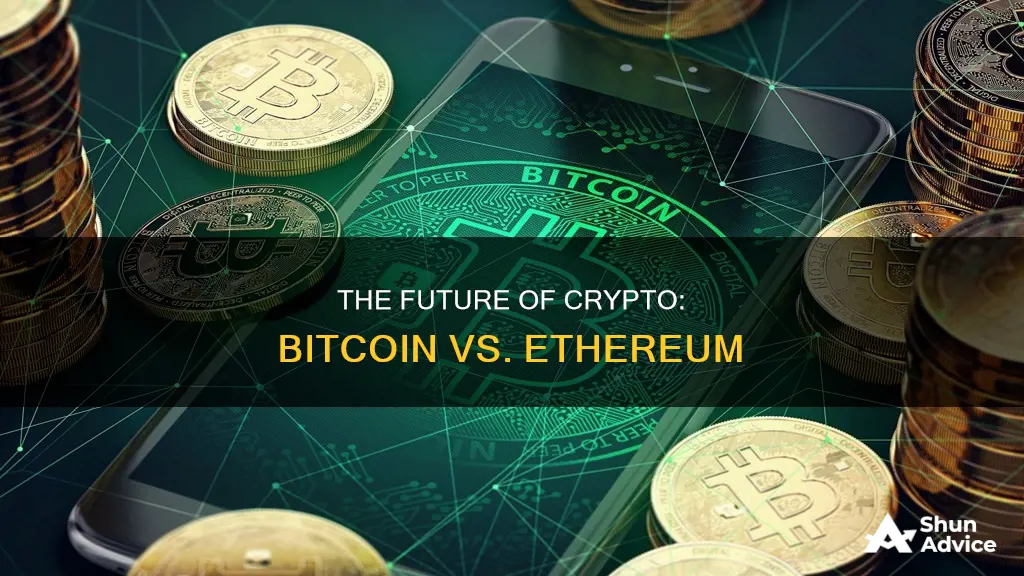
Bitcoin and Ethereum are the two biggest cryptocurrencies by market cap, but which is the better investment?
Bitcoin was the first cryptocurrency and is a decentralised digital currency that can be sent between users without a third-party intermediary. It is a blockchain-based, decentralised digital currency powered by a network of users that allows financial transactions without relying on a central authority or intermediary. Bitcoin's value rests mostly on its status as the first cryptocurrency and as an alternative to fiat currency.
Ethereum, on the other hand, is a blockchain platform that supports smart contracts and secure financial transactions. Its native cryptocurrency is Ether. Ethereum has better technology and provides more uses than Bitcoin, but Bitcoin has a lower supply and is more liquid than Ether.
Both Bitcoin and Ether have been exceptional long-term investments, but both are prone to extreme price volatility. Looking at past performance, it's difficult to choose a winner between the two.
When deciding whether to invest in Bitcoin or Ethereum, it's important to consider factors such as the size of your bankroll, whether you're looking for short or long-term gains, and your aversion to risk.
What You'll Learn

Bitcoin's value as an alternative to fiat currency
Bitcoin is a decentralised digital currency that can be sent between users without a third-party intermediary. It is not issued or controlled by a central authority, like a bank or government, and is not backed by any physical commodity. Instead, Bitcoin is produced and distributed through a process called mining. Miners are the people who process the transactions on the blockchain, creating a permanent and secure record of every Bitcoin transaction.
Secondly, Bitcoin has a finite supply of 21 million, unlike fiat currencies, which have an infinite supply as central banks can print more money at any time. This limited supply of Bitcoin helps to prevent inflation, a characteristic that investors believe will make it an effective store of value in the long term.
Thirdly, Bitcoin transactions are secure and cannot be reversed, cancelled, or charged back. This is because blockchain technology and automated consensus mechanisms verify transactions and store the information in an unalterable way.
Finally, Bitcoin is a truly global currency that can be exchanged without the need for a bank or government. This makes it a useful alternative to fiat currency in lower and middle-income countries, where access to financial services may be limited or the existing systems are inefficient or corrupt.
However, it is worth noting that Bitcoin also has several drawbacks when compared to fiat currency. One of the main issues is its extreme price volatility, which can make it a risky investment. Additionally, Bitcoin transactions are less efficient in terms of energy consumption when compared to fiat currency transactions. The environmental impact of Bitcoin mining has led to concerns about its sustainability and long-term viability.
In conclusion, Bitcoin has several advantages over fiat currency that make it a valuable alternative. However, it also faces challenges, such as price volatility and environmental concerns, that may impact its future prospects.
A Beginner's Guide: Investing in Bitcoin with Luno
You may want to see also

Ethereum's potential for growth
Ethereum is the second-largest cryptocurrency by market cap, behind Bitcoin. However, it has been argued that Ethereum has more potential for growth than Bitcoin. While Bitcoin's value rests on its status as the first cryptocurrency and an alternative to fiat currency, Ethereum offers more utilitarian value through its ecosystem of decentralised apps.
Ethereum's native cryptocurrency, Ether, does not have a hard supply cap, but its supply is managed through a process called "burning". Every time a transaction is completed on the Ethereum network, users must pay a transaction fee, a fraction of which is burned (destroyed). This has made Ether deflationary for extended periods, meaning more ETH has been burned than created.
Ethereum is also more than just digital money. It's an open-source blockchain that enables decentralised digital applications (dApps) or smart contracts. These are 100% secure and do not require third-party intermediaries. Smart contracts can be used for anything from selling a second-hand bicycle to setting up a fundraising initiative, or even for complex financial agreements like credit approvals and property purchases.
The potential applications of Ethereum's blockchain technology are vast. It could revolutionise the healthcare and legal industries, logistics, telecommunications, streaming services, education, social media, and e-commerce. It could also make online voting a real possibility, ushering in a new age of democratic engagement.
Ethereum's secure blockchain technology could also form the basis of an entirely new internet – Web 3.0. This new web would be completely decentralised, giving users the chance to take back control of their information and create an organic online identity.
Ethereum has received public backing from major players in finance and tech, including JP Morgan, Santander Bank, British Petroleum, Microsoft, and Intel.
In terms of transaction speed, Ethereum is also superior to Bitcoin. It can verify transactions within 20 seconds, compared to around 10 minutes for Bitcoin.
Ethereum's price has appreciated significantly, but it is argued that there is still 10x, or even 100x, long-term upside from current levels. As of July 9, 2024, the current value of Ethereum is $3,080, but by the end of 2024, it is predicted to reach $5,000. By 2025, it is expected to reach a maximum level of $6,500, and by 2030, it may go up to a maximum of $20,500.
Ethereum also has the potential to reach a comparable market capitalisation with Bitcoin, due to its uncapped supply.
However, investing in cryptocurrency is high-risk, and it's important to understand the risks involved.
Bitcoin vs Cardano: Which Crypto is the Better Investment?
You may want to see also

Bitcoin's finite supply
Bitcoin has a finite supply capped at 21 million. This is because Bitcoin inventor Satoshi Nakamoto designed the cryptocurrency with a cap to limit the supply, thereby increasing its scarcity over time and boosting demand and price. This is also a way to create a hard electronic currency without inflation.
The finite supply of Bitcoin is also a reason why it is considered a good investment. As of 2024, Bitcoin and Ethereum remain the clear crypto market leaders, with a combined market cap that makes up about 70% of the entire global cryptocurrency market. Bitcoin's value rests mostly on its status as the first cryptocurrency and as an alternative to fiat currency, while Ethereum offers more utilitarian value through its ecosystem of decentralised apps.
The Partial Bitcoin Investment Guide for Beginners
You may want to see also

Ethereum's smart contracts
Smart contracts are like contracts in the real world, but they are digital. They are computer programs stored on a blockchain. They are self-executing pieces of code that execute when the preset conditions by the involved parties are met. For example, a smart contract can be programmed to sell a house to a buyer, transfer the rights, and transfer the money to the seller when an amount greater than a particular number is offered for the property. This eliminates the middleman from the process, making the whole process cheaper and more secure.
Smart contracts are written mainly in Solidity, a high-level object-oriented language comparable to JavaScript, and compiled into low-level bytecode, which the Ethereum blockchain stores. The Ethereum Virtual Machine, a computer network that runs the Ethereum blockchain, executes the bytecode. When someone makes a transaction on the Ethereum blockchain, it triggers the smart contract to run and enforce the agreement's terms.
The decentralised and distributed nature of the ledger ensures the security and transparency of the agreement's terms, as multiple computers store the transaction details, and anyone can audit them. By using smart contracts, individuals can automate various agreements and transactions, reducing the risk of fraud and the need for intermediaries.
Smart contracts have numerous benefits for individuals and organisations. They reduce transaction costs and increase efficiency by eliminating the need for intermediaries. The self-executing nature of smart contracts ensures that the terms of an agreement are automatically enforced, increasing the security and transparency of transactions. Using a decentralised and distributed ledger also eliminates the risk of fraud, as all transactions are recorded on multiple computers and can be audited by anyone.
A recent survey by Deloitte showed that 72% of executives believe that smart contracts will play a significant role in the future of business. The market for decentralised finance (DeFi) applications built on the Ethereum blockchain has grown to over $40 billion in just a few years. Ethereum smart contracts are poised to play a significant role in shaping the future of various industries and revolutionising the way we do business.
Angel Investing: The Next Big Thing Beyond Bitcoin
You may want to see also

Bitcoin's security and decentralisation
Bitcoins Security and Decentralisation
Bitcoin is a decentralised digital currency that can be sent between users without a third-party intermediary. It is not an application or technology but is literally money in digital form. Bitcoin was created in 2008 by a person (or group of persons) using the pseudonym Satoshi Nakamoto. Satoshi wanted to create a 'trustless' currency that was 100% independent.
Bitcoin is secured by cryptography, with transactions verified by a process known as mining in which users compete to verify transactions by solving complex mathematical puzzles using powerful computers. This verification method is known as proof-of-work, or PoW. Bitcoin transactions are permanently recorded on a public ledger that can never be changed or manipulated in any way.
Bitcoin's blockchain network is a system that ensures one coin always equals another coin, no matter where it's sent or how many times. Think about miners as administrators or a decentralised authority that helps enforce the credibility of the Bitcoin network.
Bitcoin.org, the website, is a community-funded project. It recommends that users adopt good practices to protect their money. It also recommends using two-factor authentication and keeping your software up to date.
A Bitcoin wallet is like a wallet with cash. It is recommended that only small amounts of bitcoin are kept on your computer, mobile, or server for everyday use, and the rest is kept in a safer environment. An offline wallet, also known as cold storage, provides the highest level of security for savings. It involves storing a wallet in a secure place that is not connected to the network.
Bitcoin is a more popular option when it comes to being used as a payment method. It is readily available in many countries globally, and many merchants are conversant with it.
Bitcoin's established 'brand' and increasing scarcity make it an appealing proposition for more cautious investors with an eye on the long term.
Bitcoin: Should You Invest in the Crypto Craze?
You may want to see also
Frequently asked questions
Bitcoin is a decentralised digital currency that can be sent between users without a third-party intermediary. Ethereum, on the other hand, is a blockchain platform that supports smart contracts and secure financial transactions. Its native cryptocurrency is Ether.
Bitcoin is the most dominant asset in the crypto space and has greater demand and a longer track record than Ethereum. It is also more established, has a lower supply and is more liquid than Ether. Bitcoin is also more widely accepted by governments and traditional finance institutions.
Ethereum has better technology, more real-world applications and is faster and cheaper to transact with than Bitcoin. It also has the backing of major players in the financial and tech spheres, such as Microsoft and JP Morgan.
Both Bitcoin and Ethereum are high-risk investments and it is difficult to say which is the better investment. Bitcoin may be the safer option as it is more established and less volatile, but Ethereum may offer more potential for growth over the long term. Ultimately, it depends on your investment goals, risk tolerance and time horizon.







